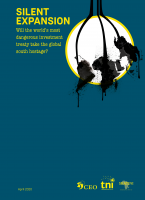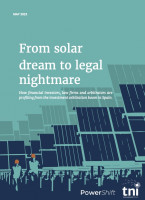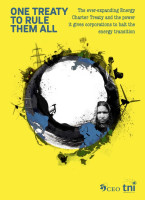Energy Charter Treaty (ECT)
Topic category
The Energy Charter Treaty (ECT) is an international agreement from the mid-1990s. Investor rights apply to 53 countries stretching from Western Europe through Central Asia to Japan, plus the EU and the European Atomic Energy Community. It grants corporations in the energy sector enormous power to sue states at international investment tribunals for billions of dollars, for example, if a government decides to stop new oil or gas pipelines or to phase out coal.
Latest
-
The Netherlands: A welfare state for the fossil fuel industry
Publication date:
Featured
-
One Treaty to rule them all The ever-expanding Energy Charter Treaty and the power it gives corporations to halt the energy transition
Publication date:
-
Silent expansion Will the world’s most dangerous investment treaty take the global south hostage?
Publication date:
-
From solar dream to legal nightmare How financial investors, law firms and arbitrators are profiting from the investment arbitration boom in Spain
Publication date:
Key documents
-
One Treaty to rule them all The ever-expanding Energy Charter Treaty and the power it gives corporations to halt the energy transition
Publication date:
-
Silent expansion Will the world’s most dangerous investment treaty take the global south hostage?
Publication date:
-
Busting the myths around the Energy Charter Treaty A guide for concerned citizens, activists, journalists and policymakers
Publication date:
-
From solar dream to legal nightmare How financial investors, law firms and arbitrators are profiting from the investment arbitration boom in Spain
Publication date:
Experts
-
Lucía Bárcena Project Coordinator

-
Niels Jongerius Dutch Outreach Officer

-
Pietje Vervest Associate Researcher

Silent Expansion
Two decades ago, and without significant public debate, an obscure international investment agreement entered into force. The Energy Charter Treaty (ECT) gives foreign investors in the energy sector sweeping powers to sue states for millions of dollars over government actions that have supposedly ‘damaged’ their investments.



